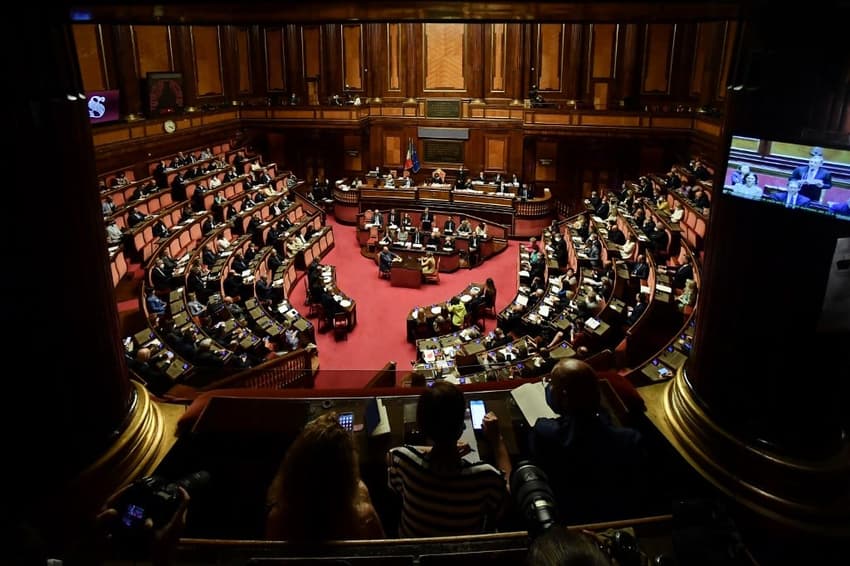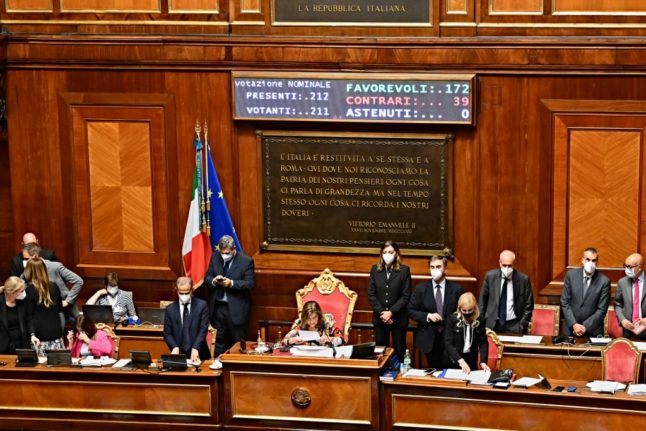How does Italy's overseas constituencies system work in elections?

Italy is one of a small number of countries whose citizens living overseas have their own dedicated parliamentarians. How does the system work - and how did Italians abroad vote in the 2022 elections?
How does the system work?
The overseas constituencies system was introduced via a 2001 law that gave Italians living abroad the right to vote by postal ballot for the first time. It was first used to elect parliamentarians in 2006.
There are four overseas constituencies in Italian parliament: Europe, including Russia, Turkey and Greenland; North and Central America; South America; and Africa, Asia, Oceania and Antarctica.
Each constituency gets at least one MP and one senator, with the remaining MPs divided up proportionally according to how many Italians are living in each territory in the election year in question.
READ ALSO: Who can vote in Italy’s elections?
Currently Europe has three MPs, North and Central America two, South America two, and Africa, Asia, Oceania and Antarctica one.
Voters registered overseas are sent their ballot papers by their local consulate in advance of the election, along with instructions on how to fill them out and the deadline for returning them.
Italy isn't the only country with overseas constituencies: Algeria, Angola, Cape Verde, Colombia, Croatia, Ecuador, France, Mozambique, Panama, Portugal, Romania and Tunisia all have similar systems.
How many overseas parliamentarians are there?
Until 2020, when Italians voted to reduce their number of elected representatives by about one third, there were 18 overseas parliamentarians (12 MPs and six senators).
As of the 2022 elections, there are 12 overseas parliamentarians in all - eight MPs and four senators. That accounts for two percent of the total number of seats in Italian parliament.
READ ALSO: An introductory guide to the Italian political system

Italians living abroad can vote for their own representatives by postal ballot. Photo by Andreas SOLARO / AFP
With 100,000 Italians emigrating every year, there are double the number of Italians living abroad in 2022 (around 6 million) compared to 2003, according to Il Sole 24 Ore.
This means roughly nine percent of Italian citizens now live abroad - which has led some campaigners to call for an increase in the number of seats allocated to overseas constituents.
What do they do?
Just like those at home, overseas parliamentarians represent the interests of their constituents. In 2007 former South America deputy and senator Ricardo Merlo founded the political party MAIE (the Associative Movement of Italians Abroad) which is dedicated to the needs of Italians abroad, particularly in South America.
Overseas parliamentarians must reside in the constituency they represent - which is why Brothers of Italy leader Giorgia Meloni's pick for South America senator, former F1 driver Emerson Fittipaldi, hurriedly moved his official residence from Miami to Sao Paolo in August 2022 to run in the latest elections (he was unsuccessful).
The fact that they represent the interests of Italians spread over such a wide geographical area (four continents, in the case of Africa, Asia, Oceania and Antarctica) has led some to argue that overseas parliamentarians perform a largely symbolic, rather than practical, function.
EXPLAINED: What will a far-right government mean for Italy?
The need to collect votes across such a large number of jurisdictions has also led to allegations - and sometimes findings - of fraud. In 2021, South America senator Adriano Cario's vote was invalidated after a handwriting analysis concluded multiple ballots in his favour had been filled out by the same person.
Despite all this, when then-prime minister Matteo Renzi held a referendum in 2016 on whether Italians abroad should have their senate seats taken away, almost 60 percent of Italians voted against the idea. Ironically, the majority of Italians overseas - 65 percent - voted in favour of abolishing their own senate representation.

The new Italian parliament will have to convene no later than October 15th. Photo by Andreas SOLARO / AFP
How did Italians abroad vote in the latest elections?
As was the case in the 2016 referendum, Italians abroad voted differently to their home country counterparts.
28 percent voted for the centre-left Democratic Party (PD), 26 percent for the hard-right centrodestra coalition, 13 percent for MAIE, and 8.6 percent for the populist Movimento 5 Stelle (M5S), with the remainder going to a large number of smaller parties.
That's in contrast to Italy, where 44 percent of votes went to the centrodestra, 26 percent to the centre-left coalition, and 15 percent to M5S.
READ ALSO: Giorgia Meloni’s party will likely win the elections – but will it last?
The final result was seven PD parliamentarians (four MPs, three senators), two parliamentarians for the centrodestra alliance (both MPs), two for MAIE (one MP, one senator), and one MP for M5S.
Europe now has one PD, one centrodestra and one M5S deputy and one PD senator; North and Central America have one PD and one centrodestra deputy and one PD senator; South America has one PD and one MAIE deputy and one MAIE senator; and Africa, Asia, Oceania and Antarctica have one PD deputy and one PD senator.
Turnout in 2022 was the lowest it has ever been among Italians abroad, with just 27 percent of those eligible bothering to vote - a drop of 3.4 percent on the 2018 elections.
Comments
See Also
How does the system work?
The overseas constituencies system was introduced via a 2001 law that gave Italians living abroad the right to vote by postal ballot for the first time. It was first used to elect parliamentarians in 2006.
There are four overseas constituencies in Italian parliament: Europe, including Russia, Turkey and Greenland; North and Central America; South America; and Africa, Asia, Oceania and Antarctica.
Each constituency gets at least one MP and one senator, with the remaining MPs divided up proportionally according to how many Italians are living in each territory in the election year in question.
READ ALSO: Who can vote in Italy’s elections?
Currently Europe has three MPs, North and Central America two, South America two, and Africa, Asia, Oceania and Antarctica one.
Voters registered overseas are sent their ballot papers by their local consulate in advance of the election, along with instructions on how to fill them out and the deadline for returning them.
Italy isn't the only country with overseas constituencies: Algeria, Angola, Cape Verde, Colombia, Croatia, Ecuador, France, Mozambique, Panama, Portugal, Romania and Tunisia all have similar systems.
How many overseas parliamentarians are there?
Until 2020, when Italians voted to reduce their number of elected representatives by about one third, there were 18 overseas parliamentarians (12 MPs and six senators).
As of the 2022 elections, there are 12 overseas parliamentarians in all - eight MPs and four senators. That accounts for two percent of the total number of seats in Italian parliament.
READ ALSO: An introductory guide to the Italian political system

With 100,000 Italians emigrating every year, there are double the number of Italians living abroad in 2022 (around 6 million) compared to 2003, according to Il Sole 24 Ore.
This means roughly nine percent of Italian citizens now live abroad - which has led some campaigners to call for an increase in the number of seats allocated to overseas constituents.
What do they do?
Just like those at home, overseas parliamentarians represent the interests of their constituents. In 2007 former South America deputy and senator Ricardo Merlo founded the political party MAIE (the Associative Movement of Italians Abroad) which is dedicated to the needs of Italians abroad, particularly in South America.
Overseas parliamentarians must reside in the constituency they represent - which is why Brothers of Italy leader Giorgia Meloni's pick for South America senator, former F1 driver Emerson Fittipaldi, hurriedly moved his official residence from Miami to Sao Paolo in August 2022 to run in the latest elections (he was unsuccessful).
The fact that they represent the interests of Italians spread over such a wide geographical area (four continents, in the case of Africa, Asia, Oceania and Antarctica) has led some to argue that overseas parliamentarians perform a largely symbolic, rather than practical, function.
EXPLAINED: What will a far-right government mean for Italy?
The need to collect votes across such a large number of jurisdictions has also led to allegations - and sometimes findings - of fraud. In 2021, South America senator Adriano Cario's vote was invalidated after a handwriting analysis concluded multiple ballots in his favour had been filled out by the same person.
Despite all this, when then-prime minister Matteo Renzi held a referendum in 2016 on whether Italians abroad should have their senate seats taken away, almost 60 percent of Italians voted against the idea. Ironically, the majority of Italians overseas - 65 percent - voted in favour of abolishing their own senate representation.

How did Italians abroad vote in the latest elections?
As was the case in the 2016 referendum, Italians abroad voted differently to their home country counterparts.
28 percent voted for the centre-left Democratic Party (PD), 26 percent for the hard-right centrodestra coalition, 13 percent for MAIE, and 8.6 percent for the populist Movimento 5 Stelle (M5S), with the remainder going to a large number of smaller parties.
That's in contrast to Italy, where 44 percent of votes went to the centrodestra, 26 percent to the centre-left coalition, and 15 percent to M5S.
READ ALSO: Giorgia Meloni’s party will likely win the elections – but will it last?
The final result was seven PD parliamentarians (four MPs, three senators), two parliamentarians for the centrodestra alliance (both MPs), two for MAIE (one MP, one senator), and one MP for M5S.
Europe now has one PD, one centrodestra and one M5S deputy and one PD senator; North and Central America have one PD and one centrodestra deputy and one PD senator; South America has one PD and one MAIE deputy and one MAIE senator; and Africa, Asia, Oceania and Antarctica have one PD deputy and one PD senator.
Turnout in 2022 was the lowest it has ever been among Italians abroad, with just 27 percent of those eligible bothering to vote - a drop of 3.4 percent on the 2018 elections.
Join the conversation in our comments section below. Share your own views and experience and if you have a question or suggestion for our journalists then email us at [email protected].
Please keep comments civil, constructive and on topic – and make sure to read our terms of use before getting involved.
Please log in here to leave a comment.